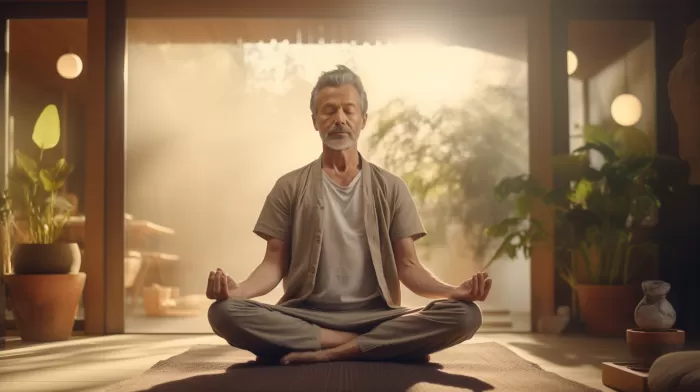Aging can bring its fair share of challenges, including the all-too-common struggle of falling and staying asleep. But what if there was a natural way to ease insomnia, boost your mood, and increase your energy levels? Research suggests that mindfulness meditation may provide an effective solution to improve the sleep quality of older individuals.
Understanding Sleep Problems Among Older Adults
It’s normal to experience changes in your sleeping patterns as you age, but for over 50% of people aged 55 and older, sleep issues become more than just an occasional annoyance. Persistent insomnia can lead to several adverse effects, including increased fatigue, depression, and a lower quality of life overall.
In some cases, chronic sleep problems might even be linked to more severe health risks, such as cardiovascular disease and premature death. Given the potential consequences, finding a way to alleviate these sleep disturbances is vital for older adults.
The Power of Mindfulness Meditation
Researchers at the University of Southern California, Los Angeles, examined the potential benefits of mindfulness meditation on the sleep of older people who frequently experienced difficulties falling asleep and staying asleep. The study involved two dozen participants, averaging 66 years of age, who were trained in mindful awareness and mindfulness meditation. Their sleep quality was then compared to a control group that did not receive any meditation training.
The results were striking: mindfulness meditation led to significant improvements in insomnia symptoms, boosted participants’ moods, increased their energy levels, and reduced fatigue. Based on the study’s findings, mindfulness meditation appears to be a promising technique for addressing sleep problems in older adults.
Incorporating Mindfulness Meditation into Your Sleep Routine
So how can you start practicing mindfulness meditation and reap the benefits for your sleep and overall well-being? It’s simple to incorporate this powerful technique into your routine with these steps:
- Find a quiet, comfortable space: Choose a location where you feel at ease, free from distractions and interruptions. This could be a room in your home, a quiet corner in your backyard, or even a serene spot at a nearby park.
-
Settle into a comfortable posture: You can sit on a cushion or chair, lie down, or even stand if you prefer. The key is to choose a posture that allows you to remain still and relaxed during your meditation.
-
Focus on your breath: As you settle into your posture, bring your attention to your breath. Notice the sensations of the air entering and leaving your nostrils, or the rise and fall of your chest or abdomen as you breathe. Don’t try to control your breath or change it in any way – simply observe it with non-judgmental curiosity.
-
Acknowledge distractions and let them go: It’s normal for your mind to wander during meditation, but when you notice that you’ve become distracted, gently bring your attention back to your breath. Be kind to yourself in these moments, remembering that it’s all part of the process.
-
Extend your practice to daily life: Mindfulness isn’t just for meditation – it can be a powerful tool for helping you navigate everyday situations with greater ease and clarity. Practice bringing your attention to the present moment throughout your day, whether you’re washing dishes, standing in line, or spending time with loved ones.
By developing a consistent mindfulness meditation practice, you can support better sleep and foster a greater sense of well-being as you age. And the best part? It’s a drug-free, non-invasive approach that you can begin exploring right now.
Additional Resources for Mindfulness Meditation
If you need further guidance or inspiration for your mindfulness practice, here are some reputable resources to explore:
- The Mindfulness App: Contains guided meditations, customizable timers, and other tools to help you develop a daily mindfulness practice.
- UCLA Mindful: An app developed by the UCLA Mindful Awareness Research Center, offering guided meditations, mindfulness tips, and more.
- 10% Happier: A popular meditation app featuring a variety of mindfulness teachers and practices tailored to your individual goals and preferences.
- Headspace: Well-known for its guided meditations and wide range of mindfulness topics, this app provides resources for beginners and experienced practitioners alike.
This wealth of resources makes starting a mindfulness practice more accessible than ever. Why not give it a try and see how it improves your sleep and overall well-being?



